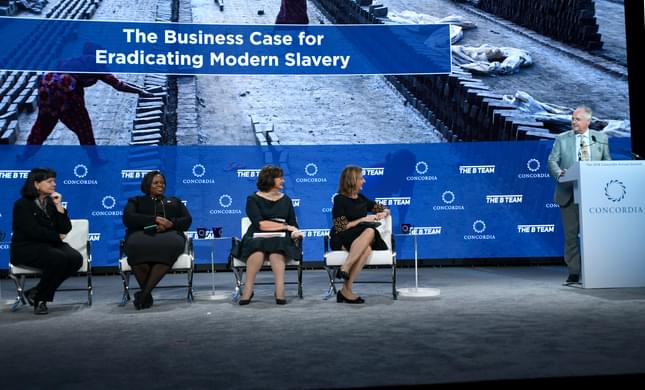History
2013
The Path Toward Better Business
In January 2013, following a series of workshops with civil society organisations, systems experts, sustainability pioneers, economists and entrepreneurs, a group of business and civil society leaders came together to discuss the role of the private sector in addressing the world’s most pressing problems. Through these meetings, efforts to advance a plan for better business began.
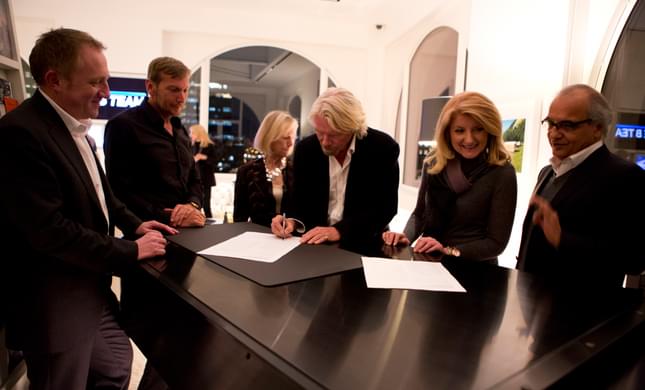
Introducing The B Team
“We are working with government agencies, the social sector, and business leaders to help get on top of some of the world’s seemingly intractable challenges. We are keen to listen, learn and share with others to build businesses that do what’s right for people and the planet.”
Co-founded by Sir Richard Branson and Jochen Zeitz, The B Team officially launched on June 13, 2013. In more than 470 cities and 73 countries around the world, business and civil society leaders joined us at 1,200 kick-off events to help shape a ‘Plan B’ for business.
Read our declaration
A New ‘Plan B’ For Business
Plan A—where business has been motivated primarily by profit—is no longer an option. We knew this when we came together in 2013. United in the belief that the private sector can, and must, redefine both its responsibilities and its own terms of success, we imagined a ‘Plan B’ – for concerted, positive action to ensure business becomes a driving force for social, environmental and economic benefit. We are focused on driving action to achieve this vision by starting ‘at home’ in our own companies, taking collective action to scale systemic solutions and using our voice where we can make a difference.
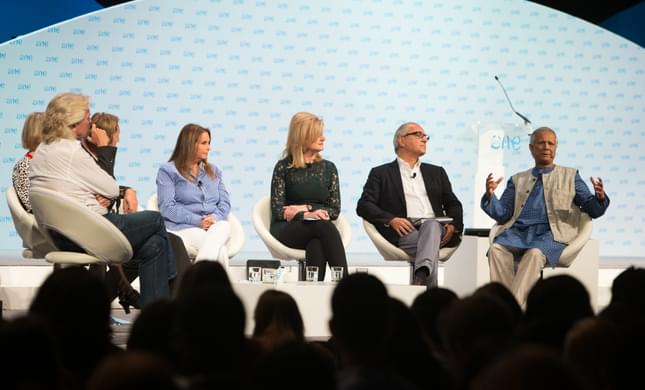
In October 2013, we came together for a panel on the future of business at the One Young World Summit, following which we spent three days together to discuss how we could best tackle our Challenges and implement Plan B.
2014
Making Ownership Everyone’s Business
In March 2014, we partnered with Global Witness to help foster business engagement around ending anonymous companies. This later led to the development and launch of our Beneficial Ownership Transparency Working Group, building a trusted space for dialogue and action between business and civil society to put an end to anonymous companies.
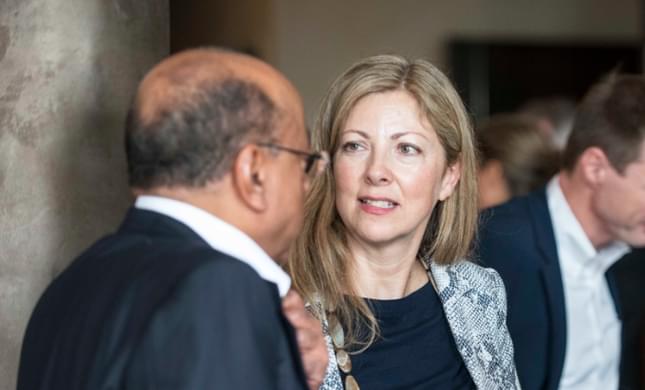
Building the "B" Agenda

In June 2014, we came together to build out our agenda further—especially around our work to end anonymous companies, support an ambitious global climate agreement and create a fair future of work.
Launch of the We Mean Business Coalition
During Climate Week 2014 in New York, we joined six partners to show the world we meant business on climate, helping launch the We Mean Business coalition.
2015
Aiming for Net-Zero by 2050
“A target of net-zero emissions by 2050 is not only desirable but necessary. This is the time to redouble our efforts and further accelerate progress to decarbonize our economy. This is not going to be easy, but the earlier we act, the greater the economic opportunities will be.”
In February 2015, we called for global leaders to commit to net-zero greenhouse gas emissions by 2050.
Our Collective Challenges
At the World Economic Forum’s Annual Meeting in 2015, we launched a set of 10 Challenges to provide a framework for Plan B.
Drive Full Transparency
Companies are open, transparent and free from corruption. Better business means prioritising good governance and accountability at all levels. The private sector works to provide all stakeholders with accurate, timely and useful information.
Foster Collaboration
The private sector cannot build a sustainable and equitable future alone. No progress is made when business operates in a vacuum. Businesses partner with other companies, governments, trade unions, and civil society to accelerate positive change.
Restore Nature
Climate change is threatening the world’s most vulnerable people, communities and economies. And it’s time for business to act. Corporates actively work to reduce their environmental impact and plan for a net-zero future where everyone can thrive.
Scale True Accounting
A company’s bottom line cannot be measured purely by monetary profits and losses. Businesses evaluate and communicate social and environmental impacts as well as plans for improvement.
Create Thriving Communities
Companies create safe and encouraging places for employees and communities to thrive. When communities are failing, so is business. Corporates prioritise employee wellbeing at all levels of an organisation to build and reinforce strong societies.
Reinvent Market Incentives
Government policies, corporate structures and tax systems benefit both the planet and its people. New market incentives and subsidies develop that promote healthy corporate behavior. And business can serve as an advocate for these equitable structures.
Ensure Dignity and Fairness
Businesses respect all people—those they employ and those they don’t. No workers live in fear or suffer exploitation. Throughout their supply chains, companies ensure that their workers’ rights are protected and treat them with dignity and respect.
Redefine Reward Systems
Businesses integrate social and environmental performance targets into compensation systems. Companies pay all employees equally and champion efforts to close the pay gap globally. Corporates recognise that these efforts are crucial to fighting inequality around the world.
Value Diversity
Business fights for inclusion of race, gender, sexual orientation and more across workplaces. Companies ensure equality of opportunity for all employees. The private sector advocates for policies that support a diverse and inclusive workforce.
Lead For The Long Run
It’s time for short-term, profit-driven and shareholder-focused business to end. A focus on long-term impact in planning is key to a future where everyone thrives. The private sector works to develop new ways of accounting and reporting that serve all stakeholders.
Creating the path together
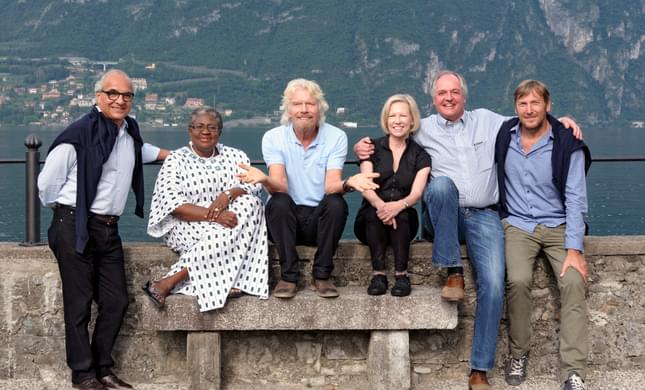
In June 2015, we came together with various subject matter and policy experts to discuss how we could deliver the most ambitious climate agreement at COP21 and mobilise around the forthcoming Sustainable Development Goals (SDGs). We also identified new areas to tackle including how we could accelerate a just transition to net-zero emissions by 2050.
Business and the Sustainable Development Goals
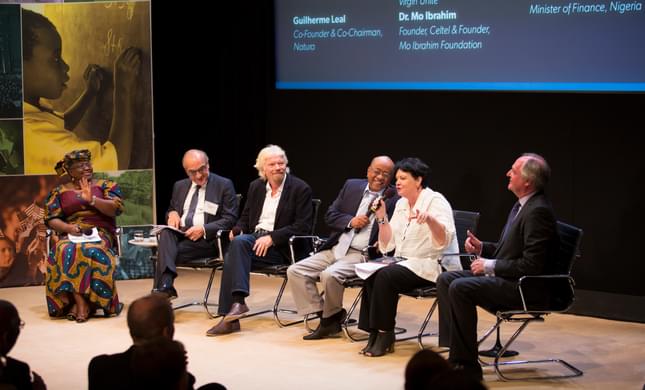
Alongside the launch of the SDGs in September 2015, we hosted a discussion around the imperative of business action in achieving the Goals.
The Promise of the Paris Agreement
“Economic growth and action on climate can go hand-in-hand.”
At COP21, we continued our call for net-zero emissions by 2050. Our call for this ambitious goal resulted in a long-term target being incorporated into the text and provided a strong signal to the world that business wants, and needs, urgent climate action.
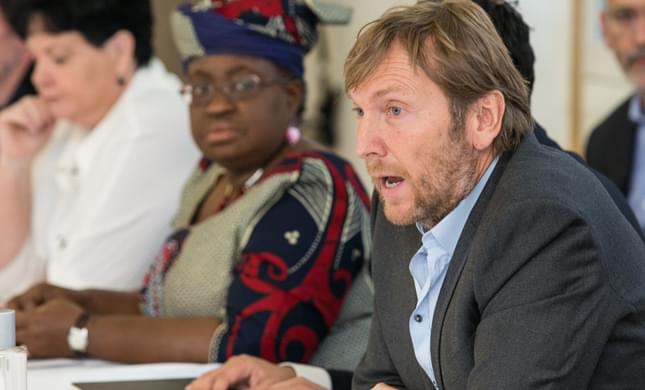
Read more
2016
The Business Imperative of Sustainable Development
At the World Economic Forum’s Annual Meeting in January 2016, we joined the UN Foundation, the World Business Council for Sustainable Development, Unilever and McKinsey to launch The Global Commission on Business and Sustainable Development. Created by B Team Leader and Unilever CEO (2009-2018) Paul Polman and former United Nations Deputy Secretary General Mark Malloch-Brown to articulate and quantify the compelling economic case for businesses to engage in the SDGs, the two-year long project produced a substantial report outlining the market opportunities for companies invested in sustainable approaches.
Read more
Introducing "Born B"

In April 2016, we launched Born B—an initiative aimed at helping entrepreneurs build businesses that serve the people and the planet from the start. The launch included a fireside chat in Silicon Valley between B Team Co-Founder Richard Branson and B Team Leader and Salesforce Founder and Co-CEO Marc Benioff, and focused on the need for emerging tech companies and investors to embrace our foundational principles.
It’s No Secret, Anonymous Companies are Bad for Business
At the International Anti-Corruption Conference in November 2016, we unveiled ownershiptransparency.com—a website designed to provide the tools and resources needed for the private sector to help end anonymous companies.
Supporting the Anti-Corruption Movement
In addition, we joined governments, business leaders, activists, civil society and more to voice our support for the global anti-corruption movement alongside the International Anti-Corruption Conference.
2017
Introducing The B Team Africa
Bold, progressive African CEOs, policymakers, civil society leaders and entrepreneurs joined The B Team mission for the launch of our first ever Regional B Team. With leadership from Bob Collymore, Dr. Ngozi Okonjo-Iweala, Dr. Mo Ibrahim, and Jochen Zeitz, The B Team Africa is a Pan-African platform to enable committed business and civil society leaders to work collectively in driving progress and addressing critical issues across the continent.
Read more
Looking Past Panama
“A year on, we have moved a step closer to shining a light on who owns and controls companies with the creation of OpenOwnership, the first public, open data, global database of company ownership information.”
One year after the Panama Papers leak, we told a bold step toward transparency in corporate ownership, helping launch OpenOwnership.org: the world’s first open, global beneficial ownership register.
Read more
Marching for Jobs and Justice
In April 2017, we joined hundreds of thousands of people in Washington, DC to march for climate action that delivers jobs, justice and the biggest economic opportunity of our lifetime.
Dear Mr. President: Stay in Paris
In May 2017, we mobilised 30 US-based CEOs to urge President Trump to keep the US in the Paris Agreement. And while the US ultimately withdrew, this action helped spawn the #WeAreStillIn movement and a groundswell of non-state actors in the US pledging their commitment to keep the promise of the Paris Agreement. Read our letter here.
Read more
A Net-Zero Future That Leaves No One Behind
Building on our work to accelerate the shift to a net-zero economy that leaves no one behind, we discussed the importance of a just transition that both honours the contributions of fossil fuel workers and protects their right to a thriving future.
2018
Pressing for Progress on Civic Rights
“We might have been focused on too big to fail, but what we’ve said to people is you are too small to care.”
In January 2018, we joined business leaders at the World Economic Forum’s Annual Meeting to host a conversation around our new area of work: protecting civic rights. B Team Leaders Sharan Burrow, Andrew Liveris and Paul Polman joined Rajiv Shah, President of the Rockefeller Foundation, to discuss how—and why—business can act in the face of growing threats to civic rights around the world.
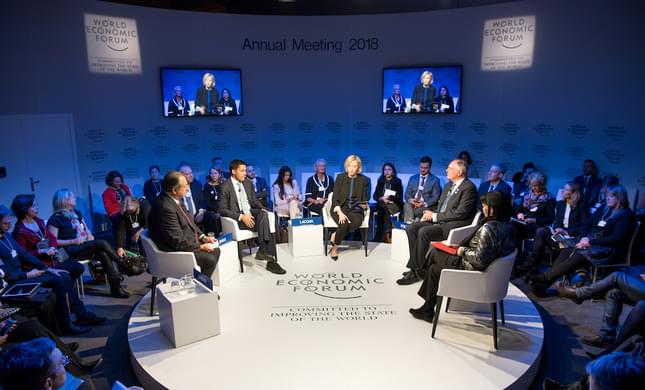
Read more
A New Bar for Responsible Tax
Bringing together the heads of tax from nine multinationals, we set out to address a critical opportunity for business and society: responsible tax practice. Facing an alarming decline in public trust, we saw an opportunity to take a bold step to restore corporate integrity while building a fairer, greener and more human world. Investors, international institutions and civil society came together and developed a new framework for approaching tax with a set of Responsible Tax Principles—now endorsed by 15 major multinationals.
Read more
A Pledge for a Just Transition
Ahead of the Global Climate Action Summit in September 2018, businesses stood up to support workers and ensure a just transition and decent jobs in the renewable energy sector. Both renewable energy developers and producers, and renewable energy buyers, committed, and are continuing to commit, to a future that reduces emissions and builds inclusive economies by taking the Pledge for a Just Transition to Decent Jobs.
Read more
Eradicating Modern Slavery
At least 40.3 million people are living in slavery—these victims are found in every country and every industry. And it’s estimated that 16 million of them are trapped in corporate supply chains. CEOs have a unique role to play in eradicating modern slavery. That’s why, in September 2018, we created a new tool to help guide CEOs on how to take action in their companies and how to support people trapped in forced labor around the world.
